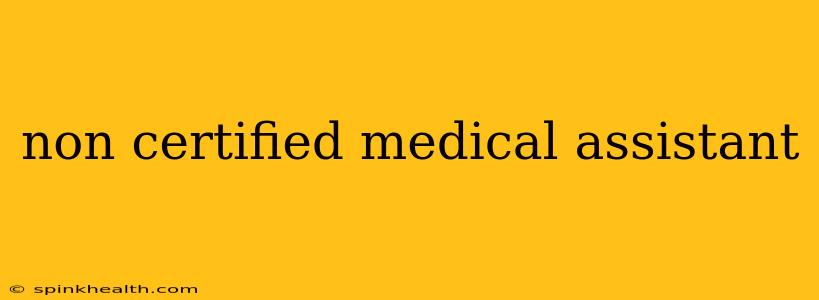The healthcare field is vast and varied, offering many pathways for individuals seeking fulfilling careers. One such path, often overlooked, is that of the non-certified medical assistant (NCMA). This isn't a title you'll find officially designated on a license or certificate, but it represents a significant portion of the healthcare workforce. This article delves into the roles, responsibilities, and career trajectories of NCMAs, addressing common questions and misconceptions.
What Exactly is a Non-Certified Medical Assistant?
Imagine a bustling doctor's office. Behind the scenes, ensuring the smooth operation, are individuals performing a range of administrative and clinical tasks. Some of these individuals hold nationally recognized certifications, such as the Registered Medical Assistant (RMA) or Certified Medical Assistant (CMA). Others, however, may have gained their skills through on-the-job training, vocational programs that don't lead to certification, or even through previous experience in related fields. These are the non-certified medical assistants. They're valuable members of the team, contributing significantly to patient care, but without the formal credentialing of their certified counterparts.
What are the Responsibilities of a Non-Certified Medical Assistant?
The daily tasks of an NCMA can vary significantly depending on the size and specialty of the practice. However, common responsibilities often include:
- Administrative tasks: Scheduling appointments, managing patient records (often electronic), answering phones, handling insurance claims, and assisting with billing.
- Clinical tasks: Taking vital signs (temperature, blood pressure, pulse, respiration), assisting with examinations, preparing examination rooms, sterilizing instruments, and collecting specimens.
It's crucial to understand that the extent of clinical tasks performed by an NCMA is often dictated by state regulations and the specific policies of their employing practice. Some NCMAs might have more clinical involvement than others, while some might focus primarily on administrative duties.
How Does the Role Differ from a Certified Medical Assistant?
The key distinction lies in formal certification. Certified Medical Assistants have undergone rigorous training and passed a national certification exam, demonstrating a standardized level of competency. This certification often opens doors to more advanced roles and higher pay. NCMAs, while performing similar tasks, lack this formal credential. This doesn't diminish their contributions, but it might affect their career progression and earning potential.
Can a Non-Certified Medical Assistant Advance Their Career?
Absolutely! While the lack of certification might present some initial limitations, NCMAs can still advance their careers through several avenues:
- Gaining experience: Years of consistent, positive performance in a medical setting builds valuable expertise and can lead to promotions within a practice.
- Pursuing certification: Many NCMAs choose to obtain their CMA or RMA certification later in their careers, enhancing their skills and opening up new opportunities. This often involves completing a formal training program.
- Specializing in a specific area: Focusing on a niche, like phlebotomy or EKG, can create a specialized skill set that is highly valued.
What is the Salary Range for a Non-Certified Medical Assistant?
Salary varies greatly depending on location, experience, and the responsibilities of the role. Generally, NCMAs earn less than their certified counterparts due to the lack of formal credentialing. However, with experience and skill development, it's possible to earn a competitive wage.
How Can Someone Become a Non-Certified Medical Assistant?
There isn't a single, standardized pathway to becoming an NCMA. Many enter the field through:
- On-the-job training: Some medical practices provide in-house training to individuals with basic administrative or clinical experience.
- Vocational programs: While not always leading to certification, some vocational schools offer medical assisting programs.
- Prior related experience: Individuals with experience in healthcare support roles might transition into a medical assisting position without formal training.
Remember, the path to a career as an NCMA isn't standardized, and its success relies heavily on practical experience, dedication, and a commitment to continuous learning.
What are the job prospects for Non-Certified Medical Assistants?
The job market for medical assistants is generally strong, with demand expected to continue growing. While certified medical assistants typically have a competitive advantage, there's still a need for non-certified individuals, especially in smaller practices or those with limited budgets. Job prospects are likely to be better for those with proven experience and demonstrable skills.
This journey into the world of non-certified medical assistants highlights the diversity and dynamism of the healthcare workforce. While certification offers clear advantages, NCMAs play a vital role, showcasing the various paths to contributing to patient care.

